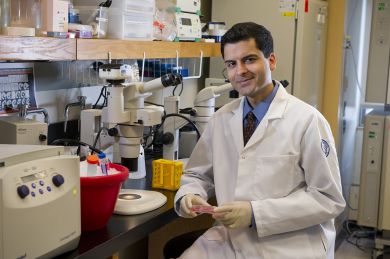New knowledge of how diseased cells make proteins may have applications to cancer research
Scientists have long known that diseased cells produce proteins that help them thrive in the body. These proteins sometimes allow the cells to undermine mechanisms that the body uses to rid itself of undesired cells. Now, Weill Cornell Medicine researchers have discovered precisely how this subversion is possible — a finding that may explain how diseases like cancer flourish in the body and could lead to the development of new treatments, an avenue of research this team is now exploring.
Normal cells produce proteins using tiny particles called ribosomes. Ribosomes look for and bind to caps at the end of strand-like molecules called messenger RNA, which are copied from the DNA in the cell nucleus. These caps are recognizable because they are made of a unique nucleotide — the building block that makes up mRNA. After binding to these caps, ribosomes take genetic information from the mRNA and use it to help build proteins that healthy cells need to function, a process called translation.
In diseased cells, ribosomes don't look for these caps. Instead, the ribosomes seem to latch onto a different location on the mRNA strand and achieve translation without binding to the cap — a process called cap-independent translation. These mRNA subsets often contain instructions for making proteins that are important for diseased cells to survive and multiply. This is particularly prominent in cancer and supports the disease's growth.
Cap-independent translation is a phenomenon that scientists have observed for years but have not completely understood. In a new study, published online Oct. 22 in Cell, a team of scientists from Weill Cornell Medicine, Cornell University, and SUNY Downstate Medical Center explains how this form of translation is possible.
"Our team has uncovered a pathway through which cap-independent translation can be turned on and off, raising the possibility that diseased cells might use this mechanism to regulate the translation of specific mRNAs that are important for survival or proliferation," said senior author Dr. Samie Jaffrey, a professor of pharmacology at Weill Cornell Medicine. "This discovery has important clinical ramifications because it identifies a novel pathway that can potentially be targeted therapeutically."
The research team found that cap-independent translation relies on a small alteration in one of the nucleotides within certain mRNAs. Nearly a third of all mRNA molecules have the chemical compound methyl attached to one of the nucleotide building blocks, adenosine — a discovery Dr. Jaffrey and his colleagues made in 2012. In their latest paper, the researchers explain that this modified nucleotide, also called m6A, is responsible for cap-independent translation.
"Nucleotide m6A directly recruits the ribosome, just like the cap does," Dr. Jaffrey said. Specifically, mRNAs that have m6A within a region near the beginning of the transcript, where the translation process starts, no longer require a cap to recruit ribosomes. Additional Weill Cornell Medicine investigators who helped make this discovery include Dr. Kate D. Meyer andDr. Deepak P. Patil, also of the Department of Pharmacology, and Dr. Olivier Elemento, of the Department of Physiology and Biophysics and the HRH Prince Alwaleed Bin Talal Bin Abdulaziz Alsaud Institute for Computational Biomedicine.
Normal cells usually contain only a few hundred mRNAs that have these special translation-promoting m6A residues. However, when researchers introduced stress to these cells, this number rapidly increased three-fold. This multiplication process may contribute to the production of proteins essential for disease progression, Dr. Jaffrey said.
"If we could develop strategies to selectively block the function of these m6A, or if we could manipulate their levels in specific mRNAs, we might have a way to halt the progression of certain diseases," added Dr. Meyer, a postdoctoral associate in Dr. Jaffrey's laboratory and the first author of the study.
The researchers are trying to understand how critical m6A-containing mRNA is for cancer survival as well as other diseases. They're also trying to block the activity of m6A to see if tumors better respond to treatment.
"The m6A nucleotide appears to have critical roles in controlling translation for certain cancer subtypes," Dr. Jaffrey said. "Identifying these cancer subtypes and how they use m6A to enable their survival will provide a completely new direction for targeting cancer and other diseases."



